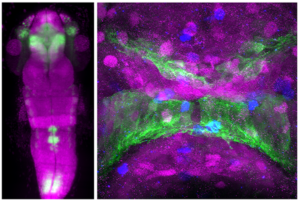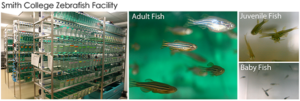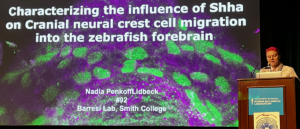
Our Questions – How Is The Vertebrate Brain Built?
- What non-neuronal cells contribute to the early building of neuronal connections between the two sides of the nervous system?

- How are neural stem cells controlled to produce the correct types of cells in the CNS, and how might these controls be used to regenerate an injured CNS?
- Could the electricity between non-neuronal cells provide an important regulating system that decides cell fate in the embryo?
Commitments and Values
We are a large and diverse team of passionate scientists curious about developmental biology and specifically the development of our nervous system. We are primarily fueled by a desire to learn the basic developmental mechanisms that build a brain using the zebrafish model system, and, in doing so, hope to provide new insights that can help ameliorate neurodegeneration and disease in humans. We commit to following all animal rights rules according to federal and state regulations for the best ethical care of all zebrafish used in this work. We and Smith College operate under the highest of animal oversight through AAALAC and IACUC guidelines.

Student Scientists
The Barresi Lab proudly offers a competitive research program at Smith College, a “primarily undergraduate institution” for women and gender non-conforming individuals. The research done in the Barresi lab is thus primarily carried out by a diverse group of undergraduate scientists. They are the ones doing the experiments, collecting the data, and contributing to the production of publications. The Barresi Lab has historically been a federally funded, larger laboratory with multiple teams of students that can also include graduate students from Smith College and from the University of Massachusetts-Amherst. All of these student scientists have benefited from the support of hired technicians and senior research scientists that play important roles in broadening the lab’s expertise and mentoring capabilities.

Undergraduate and graduate students routinely present their work at regional, national, and international conferences in the areas of Developmental Biology and Neuroscience, and they also routinely bring back awards for their presentations! From 2005 – 2022, 124 undergraduates have “graduated” from the Barresi lab with well over 90% still pursuing science professions, ~70% of whom are still active in research!
Diversity, Equity, and Inclusion (DEI)
We as a lab community are committed to recognizing and deconstructing the current power and privileges within the scientific community. Dr. Barresi, recognizes that as a white, cis-genered, heterosexual male, U.S. born citizen, he has benefited from generational privileges that have contributed to his success in science one way or another. Dr. Barresi believes that science in its truest form can offer an equalizing space for all. It can, but it has not. Dr. Barresi is committed to supporting an inclusive laboratory for all races and genders, for all perspectives – religious and political. The Barresi lab is a 100% collaborative and respectful space, and thus has 0% space for any hate. Unfortunately this is an ideal viewpoint, which is in constant opposition with the structural inequities that permeate society and that students and faculty alike can inadvertently bring into this safe space of the lab. We are therefore committed to foster an inclusive environment that strives to continually learn from one another and improve our responsibility towards anti-racism and the bringing-in of people of all racial identities, socioeconomic backgrounds, political, religious and non-religious beliefs and sexual and gender identities. The more diverse a research team, the more objective and creative the science can become.

